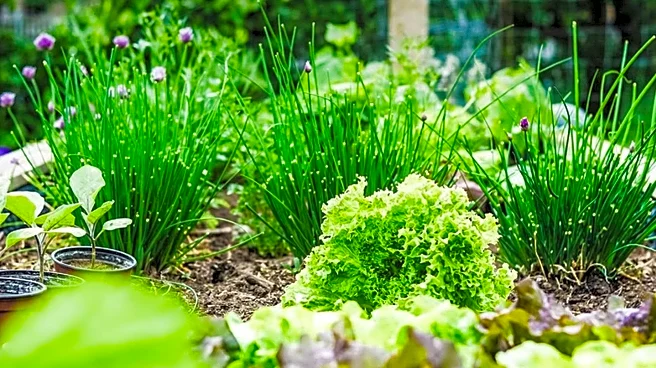What's Happening?
Roy Diblik, a horticultural expert from Northwind Nursery in Wisconsin, recently shared his insights on ecological gardening at the Berkshire Botanical Garden's 'Drawing on the Land' symposium. Diblik emphasized the importance of using natural materials like leaves and organic matter instead of wood mulch to enhance soil health. He advocates for the use of native sedges to protect the ground under shrubs and trees, arguing that these plants work in conjunction with tree roots to create a moisture-retentive environment. Diblik's approach, known as the 'Know Maintenance Garden,' promotes using plant matter to nourish and protect the soil, reducing the need for frequent lawn mowing. His philosophy is rooted in the idea that diverse root structures can share resources effectively, leading to healthier gardens.
Why It's Important?
Diblik's ecological gardening approach challenges traditional landscaping practices, which often rely on wood mulch and expansive lawns. By promoting the use of native plants and organic materials, Diblik's methods could lead to more sustainable gardening practices that conserve water and improve soil health. This approach aligns with broader environmental goals, such as reducing chemical use and enhancing biodiversity. Gardeners and landscapers adopting these practices may contribute to healthier ecosystems and reduced maintenance costs. Diblik's ideas resonate with the growing movement towards sustainable living and environmental stewardship, offering practical solutions for individuals and communities seeking to minimize their ecological footprint.
What's Next?
As Diblik's ideas gain traction, there may be increased interest in workshops and courses that teach his ecological gardening methods. Botanical gardens and educational institutions might consider incorporating his techniques into their programs, fostering a new generation of gardeners committed to sustainable practices. Additionally, landscape designers and homeowners may begin to experiment with native plantings and organic soil amendments, potentially leading to a shift in industry standards. The broader adoption of these practices could influence public policy on urban landscaping and green spaces, encouraging municipalities to support ecological gardening initiatives.
Beyond the Headlines
Diblik's advocacy for ecological gardening touches on deeper cultural and ethical dimensions, such as the relationship between humans and nature. His approach encourages gardeners to observe and learn from natural ecosystems, fostering a sense of stewardship and responsibility. This perspective challenges the conventional view of gardens as controlled environments, promoting a more harmonious interaction with the natural world. As more people embrace these ideas, there may be a cultural shift towards valuing biodiversity and ecological balance in personal and community spaces.









